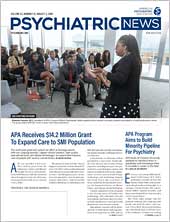More than a third of U.S. adults use medications whose labeling lists depression as a possible adverse effect, and the greater the number of such drugs used within the last 30 days, the greater the probability that these individuals will be diagnosed with depression, according to a study published June 12 in JAMA.
The cross-sectional study, which analyzed data from the National Health and Nutrition Examination Survey from 2005 to 2014, found that prevalence of depression was 15 percent for those using three or more medications with depression listed as an adverse effect but fewer than 5 percent for those not using any such medications. The pattern persisted among adults treated with antidepressants or experiencing hypertension after excluding users of other psychotropic drugs.
The study looked at more than 200 commonly prescribed drugs and included a total sample of more than 26,000 people of which 23,000 qualified for assessment. Depression was assessed using the Patient Health Questionnaire 9 (PHQ-9). Adverse-effect descriptions for each drug were drawn from the Micromedex.
Principal investigator Mark Olfson, M.D., M.P.H., discussed the findings with Psychiatric News. He is a professor of psychiatry at Columbia University Irving Medical Center and co-director of the Agency for Healthcare Research and Quality Center for Education on Research on Mental Health Therapeutics.
The study showed correlation, but not causation, Olfson stressed. “The most important limitation in this study is that it was cross-sectional. If we really wanted to make a causal statement, what we would want to know is [whether] people who took these medications over time were at increased risk of depression.” This was not possible to determine based on the design of the current study.
Another qualifier is that it was not known whether people already had depression when they started taking these medications.
Among the commonly used drugs most correlated with depression in this study were antihypertensives, hormonal contraceptives, anticonvulsants, and proton pump inhibitors (PPIs), including the PPI omeprazole, now available over the counter.
Michael Thase, M.D., a professor of psychiatry at the University of Pennsylvania Perelman School of Medicine, observed that mood and anxiety disorders are often associated with gastrointestinal issues, which would at least partially account for the association between depression and PPIs.
“We just don’t know if it’s the patient who is having the symptoms who provokes the prescription or what percentage of the time the prescription may provoke the depression,” he said.
The key take-home message, said Thase, is that clinicians often underestimate the behavioral side effects of medications commonly prescribed for nonpsychiatric conditions. Further, said Thase, the data indicate that the effect is additive.
“Clinicians must consider the possibility that when people experience the onset of depression, the illness is being provoked by treatment of another illness,” he commented. “And if that’s the case, then the proper intervention might be revising the provocative treatment—not starting an antidepressant.”
The study should alert clinicians, particularly primary care and other nonpsychiatric health care providers, of the need for more consistent assessment of patients for depression, commented Gregory E. Simon, M.D., a research professor in the Department of Psychiatry and Behavioral Sciences at the University of Washington and senior investigator for the Kaiser Permanente Washington Health Research Institute. “While we would hope that a physician prescribing an antidepressant would be monitoring the patient for depression, a doctor treating hypertension is less likely to be doing so.”
Given that depression is associated with a wide range of chronic health conditions, it is difficult to know if various medications may be worsening or triggering depression, Simon noted. While further study is needed, this question must be answered on a case-by-case basis, he concluded.
The study was funded in part by the Robert Wood Johnson Foundation as part of the Clinical Scholars Leadership program. ■
“Prevalence of Prescription Medications With Depression as a Potential Adverse Effect Among Adults in the United States” can be accessed
here.

